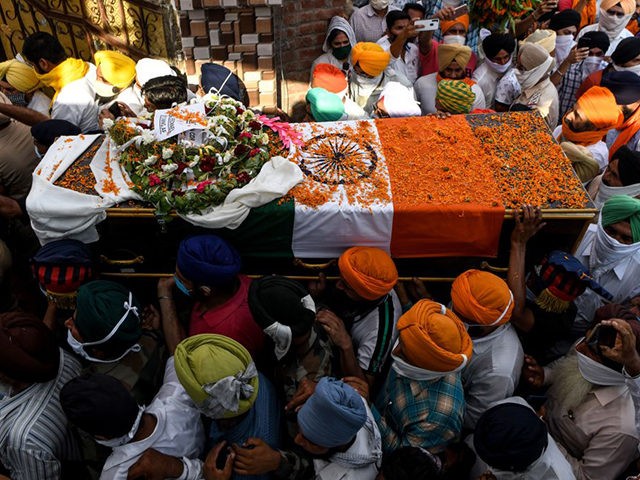A U.S. intelligence assessment states that the Chinese Communist Party is intimidating the loved ones of soldiers killed in a bloody brawl on the Indian border out of honoring their dead, US News & World Report claimed Monday.
Chinese and Indian soldiers came to blows in late June in the Galwan Valley, an area in India’s Ladakh region in the Himalayas, after Indian soldiers found that People’s Liberation Army (PLA) troops had established tents on the Indian side of the border. According to multiple reports, the PLA troops began attacking the Indian forces when confronted. As India and China had a longstanding agreement — which India has backed out of after this incident — not to allow their troops to use firearms against each other on the border, the PLA soldiers attacked their Indian counterparts with rocks, sticks, and wooden polls wrapped in barbed wire. Some soldiers died being flung off the steep cliffs of the area, while others reportedly died of hypothermia.
The Indian government reported 20 deaths and several injuries in their ranks, identifying them publicly by name and honoring them with funerals and public condolences to their families. Beijing has refused to offer any casualty count or acknowledge, much less name, any dead PLA soldiers. Indian officials estimated that about twice the number of Chinese died in the incident compared to the number of Indian troops.
US News now claims to have evidence that, beyond hiding its casualty counts, the Chinese Communist Party is actively trying to obscure the identities of the dead to prevent information about the damage it sustained from going public.
“The Chinese Ministry of Civil Affairs has told families of those who died in the Galwan Valley clash that they must forgo traditional burial ceremonies and cremate the soldiers’ remains,” the newspaper attributed to an unnamed source. Those who wanted to hold services were told to do so “remotely,” without attracting the attention of the general public, the source continued. Relatives were apparently told that gatherings like funerals could potentially spread the Chinese coronavirus, which dictator Xi Jinping said in March was no longer a problem in China.
“Though the government has used the threat posed by coronavirus as a pretext, the assessment concludes that the new rules are a part of a deliberate effort by Beijing to undermine public awareness and erase any enduring reminders of the violent clash,” US News claimed. “China reportedly fears that images of gravestones for its fallen soldiers of the People’s Liberation Army, or PLA, could further stoke those sentiments if spread on Chinese or international social media.”
Asian News International (ANI), India’s largest news service, added the observation that “it appears that China is not willing to recognise the casualties it suffered in the Galwan valley clash.”
“The grieving Chinese families who have lost their loved ones in the clash are being mistreated by the Chinese government, as per the report,” ANI asserted. “Not only the Chinese government refused to accept the casualties, it is also denying the burial of the soldiers.”
The reports complement earlier rumblings online that some of the relatives of soldiers whose status remains unknown since the incident have attempted to make public statements on Chinese social media about the situation only to have their posts censored. In late June, shortly after the clash, the outlet India Today claimed to have documented posts on Weibo, a Communist Party-controlled social media outlet similar to Twitter, that expressed frustration that the soldiers hurt or killed in the clash did not receive any respects from Beijing.
“India has held a memorial service for the sacrificial soldiers. It shows the high respect and attention of the whole country of India to the soldiers who defend the country and the land. It shows the high degree of solidarity of the Indian nation. What about us?” one alleged post read before being censored. “We should learn from India and show respect to our soldiers.”
While Beijing has not openly admitted to casualties, it has used its state media arms to affirm that some soldiers did die. The Global Times, often its most belligerent English-language media arm, urged as an afterthought in a piece about an unrelated festival, “following the recent China-India border clash, our brave PLA soldiers should never be forgotten.”
The Global Times also denied Indian officials’ claims that the Chinese had been soundly defeated in Ladakh, calling the report “utter fantasy.” Without offering the alleged truth, however, the Times did not provide any alternative to believe but the Indian government account.
Chinese troops started to retreat from where they had invaded Indian territory in early July after several rounds of talks with Indian counterparts. Satellite images showing that the offending tents the PLA established in India had disappeared after a visit by Indian Prime Minister Narendra Modi to the border, where he praised India’s military as the world’s best and declared, “the age of expansionism is over.”
In addition to not confirming or identifying any Chinese casualties, Chinese dictator Xi Jinping has been notably absent from any Chinese government response to the incident.

COMMENTS
Please let us know if you're having issues with commenting.